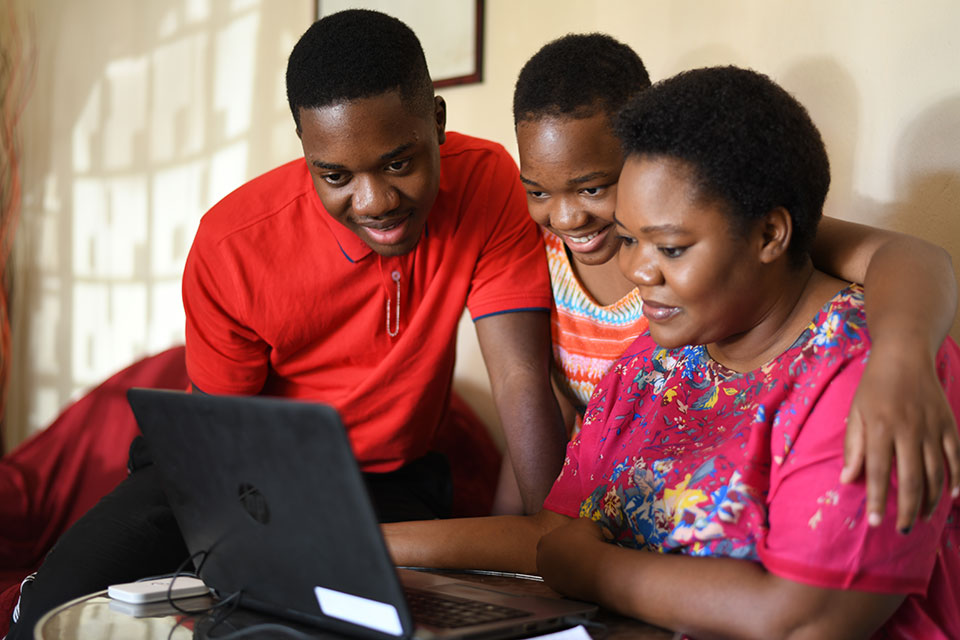Extra things to thank Moms for in 2020
Date:
Originally published on Medium.com/@UN_Women

Every year we celebrate Mother’s Day and show our appreciation for mothers everywhere, in all shapes and forms. Their immeasurable contributions shape the lives and futures of our next generations.
This year, as the COVID-19 pandemic and containment measures drastically change everyday life, moms and all caregivers have taken on tremendous added burdens. In many cases, they continue to work either from home or risk their safety to maintain the essential work that keeps our communities running.
As governments start building recovery plans for the COVID-19 economic fallout, UN Women and the International Labour Organization released a new publication, “The impact of marriage and children on labour market participation”, which provides important insights into the distribution of domestic work and caregiving responsibilities within various types of households, and takes a critical look at women’s participation in the labour force around the world.
Extra care work at home
Globally, women do three times as much unpaid care work as men, and moms around the world are often the main caregivers in their homes.
The #COVID19 pandemic is placing a greater burden on women who carry the bulk of care and domestic work at home.
— UN Women (@UN_Women) March 31, 2020
It’s on all of us to split responsibilities at home between everyone! pic.twitter.com/TxaU1s26ju
As COVID-19 containment measures keep families home, the burden of care at home has drastically increased.
Moms and caregivers are taking on a lot more responsibility for household chores and care of children and family, including by guiding their children’s online learning.
Men are reporting an increase in unpaid domestic and care work, but the lion’s share of work at home continues to fall on women and girls.
Change starts with each and every one of us, in our homes. Share the care!
Overcoming discrimination in the labour force
Globally, prime-working-age women are least likely to be in the labour force when they are living with a partner and young children.
The #COVID19 outbreak is overloading the health and care systems, placing a greater burden on women who carry the bulk of care and domestic work at home.
— UN Women (@UN_Women) March 28, 2020
Find out more: https://t.co/uGwOPAkyHD pic.twitter.com/PtK1rl8nNW
New statistics show that when children are present in a relationship, women’s work-force participation drops drastically. Because of gender norms and societal assumptions that women will take on care responsibilities and men will provide for the family, women leave paid work. Lone mothers are more likely than the average working-age woman to be in the labour force because they need to provide for themselves and their children.
Worldwide, women still earn less than men for work of equal value, and as women become mothers, the income and opportunity gaps widen. By taking on the lion’s share of unpaid care work, and especially childcare, mothers around the world miss out on full-time paid work with decent wages, benefits and pension, as well as leisure time.
To even the playing field and keep options open for moms and all caregivers, we urgently need policies that provide paid leave to both mothers and fathers, enable access to affordable and high-quality care for children and older persons, and collect more and better data on families and work.
Doing essential work
From farming to first-response services and everything in between, women and mothers are playing an outsized role in keeping their communities safe and resilient in the face of COVID-19.
Women are at the front lines of the health and care response to #COVID19, but in the background of decision making.
— UN Women (@UN_Women) April 28, 2020
🤳 Retweet if you want to see more women leaders in the global health sector. pic.twitter.com/x66nnz9AmT
Millions of women worldwide are part of the essential workforce on the front lines of COVID-19 as healthcare workers, care givers at home and community leaders and mobilisers.
Globally, 70 per cent of the health and social workforce are women, and in Spain, infection cases are twice as high among female health workers. Yet, only 30 per cent of leaders in the global health sector are women, meaning the unique needs of women nurses and doctors is not being reflected across every aspect of COVID-19 response.
Keep thanking and celebrating the front line responders in your life, and share their stories.
Here are just five women on the front lines of COVID response — make their voices heard.
Support
While COVID-19 puts physical health and safety at-risk, it’s also having a profound impact on mental health.
We are all feeling the mental toll of the #COVID19 pandemic.
— UN Women (@UN_Women) May 8, 2020
Find moments of happiness by connecting with friends and family, relaxing and practicing mindfulness.#MentalHealthMonth#MentalHealthAwareness pic.twitter.com/nhMsDAj8gF
With social isolation and physical distancing rules in effect for many countries and communities, we’re all feeling the impacts of the drastic changes and grieving. Many moms are bearing the added emotional burdens of guilt and uncertainty as they try to balance their work and home lives as the lines between work and life blur.
May is Mental Health Month, and prioritizing mental health is important during times of high stress. Remember to reach out to the moms in your life and let them know you’re there. We encourage moms, and everyone, to take a break, find moments of happiness and stay in touch, while physically distant, with friends and family.
Make a point to thank your mom, and all moms of any kind in your life, and remind them that their support, patience and resilience is always appreciated.